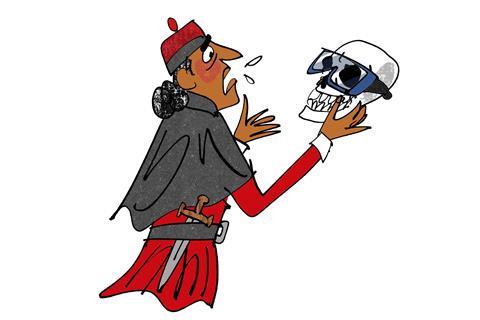How my drama background helps me build my scientific skills

There was palpable tension in the lecture theatre, people gripping their notes and whispering to each other about who should speak. A group of us had to give a presentation on green fluorescent protein localisation in different cell components to around 300 students. Despite feeling nervous too, I stepped up and led the presentation with energy and charisma. The best way to deliver it, I realised, was to keep strong eye contact with people across the room, walk around confidently, use natural hand gestures and speak with enthusiasm to keep the audience engaged.
I’m presenting, presenting, and suddenly I think to myself: this is sort of like performing. In that moment, it hit me: all those hours on stage weren’t just for fun. They’d taught me how to read a room, connect and carry people with me.
I’m a third-year undergraduate biochemistry student at the University of Manchester. A close relative of mine lives with schizophrenia, and growing up, watching them navigate hallucinations, cognitive impairments and the social consequences of their condition was incredibly difficult. But what fascinated me, and inspired me, was how antipsychotic medication, by modulating chemicals like dopamine in the brain, could bring some relief. That’s what first sparked my interest in how drugs work in the body, and why I’m so drawn to drug discovery and pharmaceutical science.
At the same time, I’ve always been a performer. From hogging the role-play corner in nursery to playing Zazu in a school play, to taking on emotionally intense roles at university – theatre has been my outlet. It’s where I’ve always felt free to move, express, and be ‘too much’. While some South Asian family members didn’t understand it, my mother always encouraged it – her father was a performer too. I’ve kept drama alongside science ever since.
Now, as co-president of the University of Manchester drama society, I’ve learned that leading a theatre society is very different from working in a lab, and just as valuable. From planning productions to managing budgets and supporting a cast, it’s taught me leadership under pressure.
Characterisation techniques
People often underestimate how much theatre skills can benefit scientists. For me, it’s been the secret weapon I didn’t realise I was using, until moments like the night before a first-year exam. A friend and I were desperately trying to memorise all the amino acids, and nothing was sticking. So, I turned to what I knew best: performance. I made up a story, complete with exaggerated characters, actions and emotional tones: happy voices for positively charged amino acids, sad ones for the negative ones. It was silly, but it worked. We both did well on the exam the next day.
That moment taught me how powerful storytelling can be in science. In labs or tutorials, I often find myself explaining concepts in animated ways, and I think that comes directly from years on stage, learning how to project, connect and keep people engaged. Acting has also helped me read people better. I pay attention to facial expressions and body language, which makes it obvious in a lab when someone’s confident or completely lost. I’ve learned to adjust how I communicate depending on who I’m working with. That emotional awareness makes a difference, not just in labs but in life.
Theatre has taught me how to connect
As someone pursuing a career in the pharmaceutical industry, truly connecting with patients means recognising more than just their symptoms. It means understanding the human experience beneath the science, something drama has helped me do without even thinking. Hosting a conference at the Excel Centre to 4000 educators about ways we can improve the current state school education system, taught me the value of clear, compelling science communication. Scientists often know the facts – but can they make people care? Theatre has taught me how to connect. And I believe science needs more of that.
Drama isn’t just a hobby for me; it’s been a lifeline. No, I don’t think it’s the most academic subject in the world, but it’s given me so much: a way to express myself, a sense of community during tough times, and skills I use every day. From public speaking and resilience to leadership and organisation, theatre has shaped the person, and scientist, I’m becoming. Guess all those late nights perfecting accents really did pay off.
Theatre, and the arts more broadly, deserve more respect in science. Many scientists, like Nobel prize winner Roald Hoffmann who co-wrote the play Oxygen about the element’s discovery, have embraced both. Communication is essential in science, especially when sharing discoveries with the wider public. That’s why I want to explore science communication in my dissertation, and why I hope to work in global medical affairs one day, where science meets strategy and storytelling.
To anyone who feels like they don’t ‘fit’ the scientist mould: good. We need you. Science thrives on originality – and that includes you, exactly as you are.












No comments yet